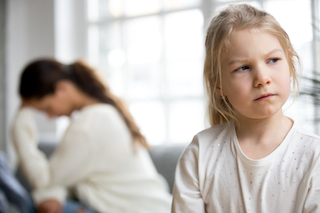 A new study published in the Journal of Depression and Anxiety (the official journal of the Anxiety and Depression Association of America) has found stress and immune biomarkers that link children and their mothers who suffer from postpartum depression.
A new study published in the Journal of Depression and Anxiety (the official journal of the Anxiety and Depression Association of America) has found stress and immune biomarkers that link children and their mothers who suffer from postpartum depression.
The current study, titled, Maternal depression alters stress and immune biomarkers in mother and child, is part of a 15-year longitudinal study that followed children of depressed mothers from birth to age ten.
“We want to draw as much attention as possible to the long-term and pervasive effects of maternal depression on child mental health, physiology, brain, and social abilities over time,” senior author, Dr. Ruth Feldman told us. “There are millions of depressed mothers (estimated at 15% in industrial societies and up to 30% in the developing world), making this the most prevalent psychiatric disorder.”
The study targeted two physiological systems - the stress response (cortisol) and the immune system, and observed parenting as well as the children's social behavior to determine what the pathways are leading from maternal depression to child vulnerability to psychiatric disorders.
“We know that children exposed to maternal depression, particularly if it’s early and chronic depression, are much more likely to develop psychopathology in later childhood, adolescence, or adult life,” Feldman told us.
For the study, Feldman and her colleagues hypothesized that children exposed to maternal depression throughout childhood would have more psychopathology meaning more diagnosed, clear cut psychiatric disorders and more psychological symptoms. They also surmised that maternal depression would impact child mental health through both physiological and behavioral pathways. They also believed they would find evidence of biological coupling which happens when maternal hormonal levels synchronize with those of the child, so that, for instance, when a mother has high cortisol levels, so will the child.
About 2000 women were recruited for the study. Researchers measured the systems of interest (immunity measured by SiGA, the first and most prevalent mucous barrier that complexes with pathogens) and stress (cortisol) in both mother and child.
Researchers found that maternal depression impacted an increase in child psychological symptoms through three pathways: Behavioral, via the stress response, and via the immune system.
Depressed mothers showed less optimal parenting. They were more negative, inconsistent, critical, less empathic, and sensitive. This was observed in both negative (when mother and child discussed a conflict) and positive (when they had to plan a fun day to spend together) contexts. As a result, children were more socially withdrawn, and lonely children are more susceptible to psychiatric disorders.
Depression increased maternal cortisol and this increased child cortisol (though the biological coupling mechanism). Children with higher cortisol are more prone to psychopathology.
Depressed mothers had higher SiGA (meaning that the body is experiencing chronic stress and responds with elevated immune response), leading to higher child SiGA, which, in turn, predicted more behavioral problems.
Researchers continue to follow the children, now 15 years of age. They’ve also developed a very specific and targeted eight-week intervention in infancy (three to eight months) that is conducted in the home which is now ongoing. Feldman is hopeful the study will raise greater public awareness of the effects of postpartum depression on children.
“I have worked with mothers and infants both clinically and as a researcher for many years,” Feldman told us. “I saw maternal depression everywhere with significant negative effects on mother and child and very little public awareness, public funds, and evidence-based interventions that specifically target maternal depression in infancy before effects on the child.”
Patricia Tomasi is a mom, maternal mental health advocate, journalist, and speaker. She writes regularly for the Huffington Post Canada, focusing primarily on maternal mental health after suffering from severe postpartum anxiety twice. You can find her Huffington Post biography here. Patricia is also a Patient Expert Advisor for the North American-based, Maternal Mental Health Research Collective and is the founder of the online peer support group - Facebook Postpartum Depression & Anxiety Support Group - with over 1500 members worldwide. Blog: www.patriciatomasiblog.wordpress.com
Email: tomasi.patricia@gmail.com